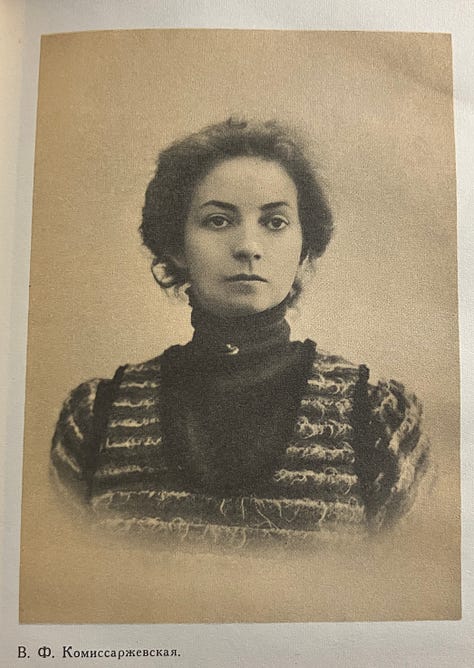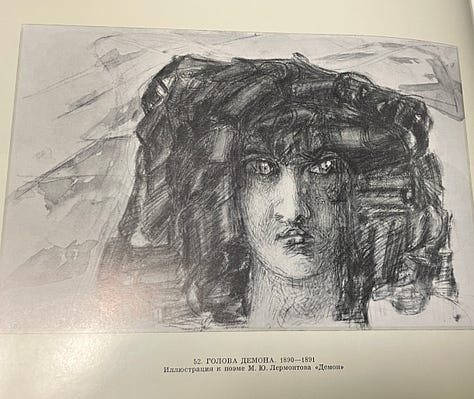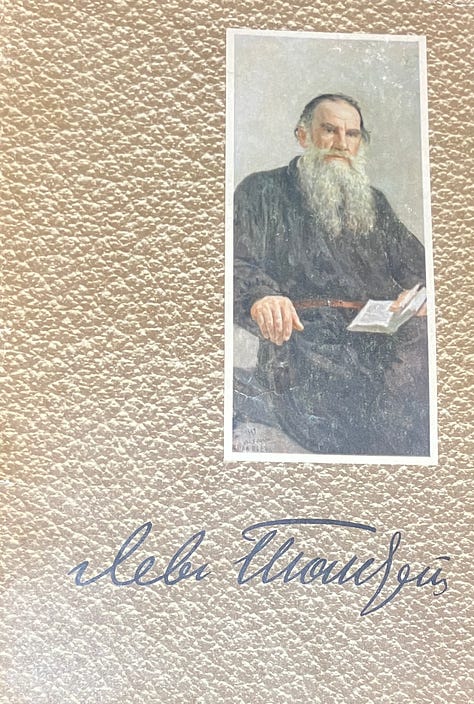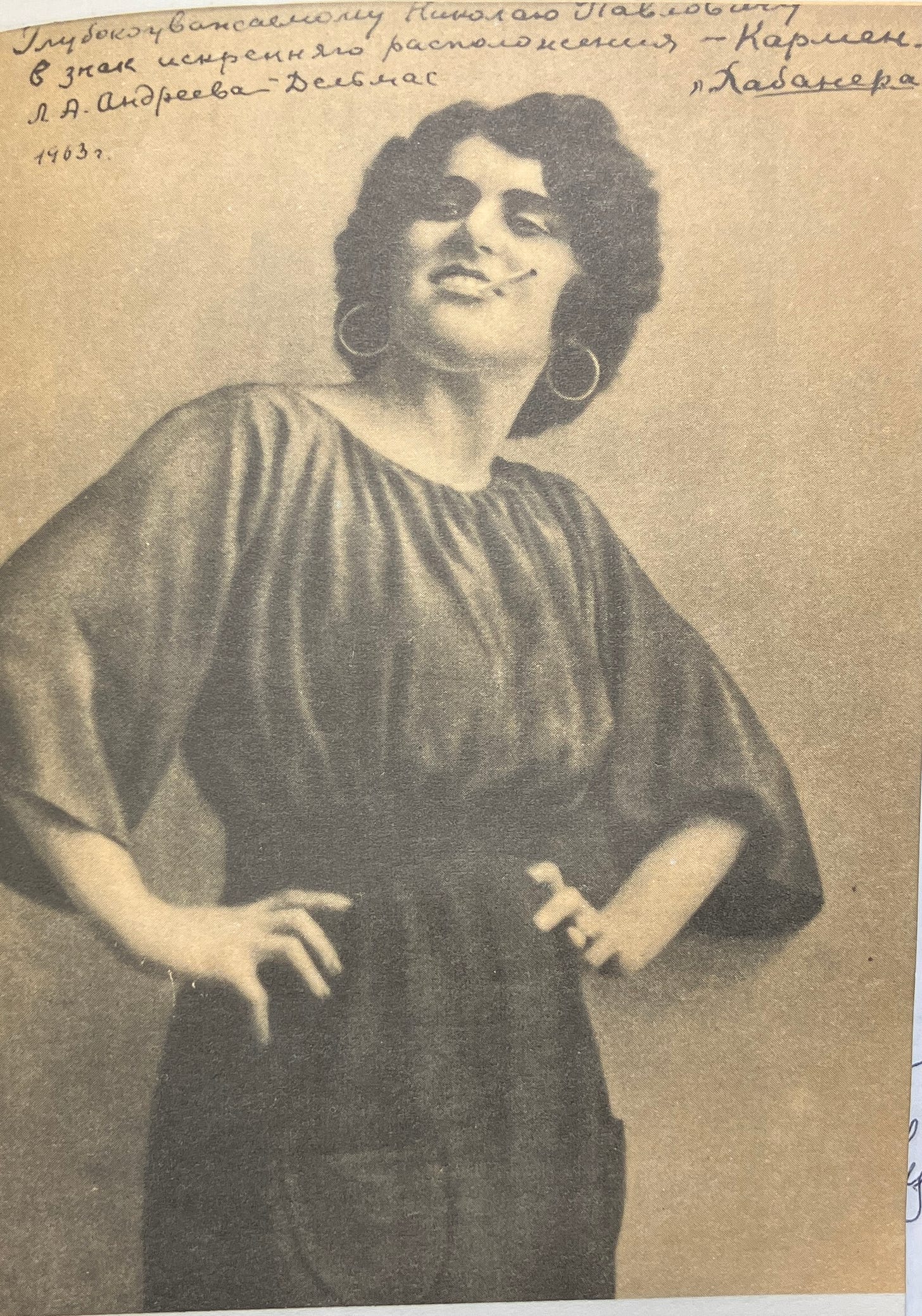The Russian Poets Before and After Revolution
Aleksandr Blok



II
1910- Blok is 30 years old and talks about the meaning of this year for him: The death of Kommissargevsky, the death of Vrubel’, and the death of Tolstoy. The lyrical tone on the stage died with Kommissargevsky. Vrubel --a huge personal world of the artist, the madness of the persistence, insatiable search to the folly. With Tolstoy died the human tenderness— the wise humanity.
He loved them and admired their art. He knew Vera Kommissargevsky well; he was shown his Balaganchik in her theater, and her sudden death shocked him. He wrote an article in her memory and poem: So, sleep, worn out by glory, / by love, life, and slander… /Now you are with your great, unrealizable dream.
(By the way, after the actress’s death, her theater continued to carry her name, and my neighbor Vladimir Osobik had been one of the leading actors of this theater in 1960-90(?).
Vrubel’s genius was legendary already in his time as a genius of a mad artist. In his article about Vrubel’, Blok writes about the discrepancy between the very simple, unpretentious Vrubel’s life and his illness of the genius. This painter used only three colors: the dark blue color of night, gold, and violet in creating the figure of Demon, his main hero from Lermontov's poem Demon. Legend tells that he repainted Demon’s head forty times. Once, somebody came to his studio, saw a painted unbelievable beauty head, and told Vrubel his opinion. What did the artist do? He destroyed this head and painted the ugly one anew. The artist became mad; he was drowning in the night of art, and then—in his death, Blok wrote about his favorite artist.
24 February 1911. In Blok’s Diary, he writes about himself in the third person: He related to everything as a poet, was a mystic, and in surrounding him anxiety, he saw the presage of the world end. For him, all the growing-up events were only images of the developing chaos. Soon, his agitation found its direction: he got to the society where the words ”revolution, mutiny, anarchy, madness” never went off their tongues. Here were the beautiful women with always crumples rose on their breasts and slightly open mouths. The wine was flowing as a river. Everyone raved; everyone wanted to destroy the family, a hearth –a strange one with their own. My hero plunged into this crazy game, like understanding everything.
Poems of this period are the same –depressing:
I am nailed to the bar counter
I have been drunk for a long time. I don’t care.
In the other poem of the same period: My earthly heart was tired / So many years, so many days…
What nevertheless happened with our hero, with our Blok?
Once, with his empty head, light and careless, but with the lurking in his soul protest against his idle and ruinous existence, he entered his apartment.
On his desk, he found two letters. One – perfumed, illiterate, and passionate. He opened the second letter. Someone, in a very short text, informed him that his father was dying. Leaving everything behind, he rushed to Warsaw.
Blok had distant relations with his father, both geographically and familial. Father paid for his university education; they were in correspondence but saw each other seldom. He knew his father stinginess, his anger, cruelness to his mother, but he feels some of these features in himself, he couldn’t refuse from his father’s blood in himself. He even, under his father’s influence, went to study law at Petersburg’s University. During his stay in Warsaw (English transliteration of this name so telling), Blok understood Polish suffering because of dependence of European country from the autocratic Russia:
A horde of Russian vulgar military forced to slumber you, /Warsaw, the capital of the ancient Poles.
Having buried his father, he returned to Petersburg with his father’s second wife and their daughter, Angelina, and helped them to settle in the city.
5 July- September 1911. Blok travels to Berlin. He wants to join Liuba, who spends this summer in Europe, in Berlin (which she didn’t like), and they continue to travel together. He misses her terribly and writes to her: All the soul in me I already gave to you and couldn’t give to anybody even when I wanted sometimes. All what is left for the others --- first of all, my mind and the feeling of the friendship, further, only the demonic feelings or some vague inclinations (rare now), or, at last, the base instincts. (I am impressed by how openly he talks with her.)
France, Paris, he enjoys the city; Bretagne, his history of churches and chapels; Quimper and Abervrak are the best places in Bretagne. Until they became boring, especially in the last town. Blok complains about the intolerable dirtiness of the people, an integral part of the French. Quimper reminded him of cozy and sweet Italian towns with its canals and small bridges.
30 August. They return to Paris. From the letter to his mother: 22-d of August, Leonardo da Vinci’s famous Giaconda was stolen from the Louvre. And he wanted to see the painting! All the newspapers try to calculate the price of today's painting, in 1911 -- 45 milliards Franks. Francisco I paid Leonardo 12000 lira in 1510.
Now, Paris is scorching hot, 30 degrees. Versailles is boring. Everything, starting from the proportions in the XVIII century, is disgusting.
October, Petersburg, Diary: Writing a diary or making notes about the most important things is necessary for all of us. Very likely our time -is the greatest, and we are at the center of life, i.e., at the place where all the spiritual threads come together, where all the sounds reach us.
Soon, he will be 31. October and November, their nights are without end; his entire world is full of night. At about 12, he goes out. Some restaurant and wine, then a variety show. Girl- acrobat comes out. He implores her to go with him. He engages a carriage with a daredevil driver, and they fly by Night City. He is beside himself. Maybe it’s not even the first daredevil, second or third. He tears her laces and batiste; there is some strange strength and secret in his arms and her pointed heels. Hours with her –in vain, tortured. He takes her back. She disappears in some lane. Something holy, like a child, a daughter. He pays the driver. Deathless of night. Cold, cutting wind. Everywhere is night, as at six in the evening or six in the morning when he goes home. The day is lost. Walk, bath tab, want to moan because this eternal night keeps and increases tenfold the same feeling -- to the insanity. He almost cried.
He decides not to see her anymore. She deprives him his passions, she cast them to the sky by her Saxon eyes. She is not the same as he saw her the first time. His feeling is that living in this world is horrible and beautiful.
1912. I bless all I had/ I was not looking for the better fate/ O my heart, how much you loved! /O my mind, how much you flamed!
Blok tries to understand if Liuba is a talented actress and goes to Tereoky, the Petersburg suburb, to see her in the plays of young director Meyerkhold. He didn’t like his staging and not very much like his wife‘s work as an actress, though he writes to his mother: Liuba is serious, busy in all plays, today will play, but I’m not
going. Comrades praised her… I am going to see her more; maybe she is an actress.
Finally, in Strindberg’s play, she was excellent, and Strindberg’s daughter, who was present at the show, praised her a lot.
(I want to forestall events because I will not have a place and time in this essay to talk about this talented director, Meyerkhold, whose second wife was Esenin’s former wife, Zinaida Raikh. He fell in love with her so passionately that he left his wife with their three daughters and married Zinaida with her two daughters from Esenin. He made Zinaida the main actress of his theatre when they moved to Moscow at the beginning of the 1930s. This move was a great mistake. Stalin loved the theatre, but not the modern theatre, as Meyerkhold’s. He closed his theatre. Despite the boost of trials in the 1930s, not all the Soviet people understood Stalin‘s role in the processes, so naive Zinaida wrote a letter to Stalin, explaining to him that he, Stalin(!) didn’t understand the Meyerkhold’s role in the modern theater and had to open his theater to continue to put the plays on the stage. The result was, naturally, murderous. Meyerkhold was arrested and bitten (he was already 65 and ill) to the degree of crying like a baby. We know about it from his letter to Kalinin, the minister of Culture of that time, published after Stalin's death. On the night 14-15 July, 1939, Zinaida was bitten to death in their apartment, in her bed, by two KGB-men, playing the scene of the apartment’s robbery. Esenin’s children were not present at the apartment on that tragic night.) NKVD shot Meyerkhold after they dealt with Zinaida.)
In that year, 1913 in July, Blok and his wife moved to their last address, so well known to me: Officers Street, #57 apt. 21.
His wife continues the constant theatrical trips, which he doesn’t approve but what can he do about it? Only to write letters to the different addresses of hers. Thank God, she wrote him rather often.
1913, 20 February. His letter to her: I think about you, where and how you are, often think and miss you sometimes, every evening go to your room and cross your small bed… I don’t love the actors, dear, it’s so painful that you want to play. Here is something shameful. Only a genius saves if there is no genius –shameful, boring, and unnecessary. The genius theater is the art; not genius is the ungrateful trade. Write a new address. Whether you return soon?
But February of 25, in five days, he already answered her next letter, asking her to write more often: Think of you with all my last tenderness; less and less want a theater for you; want more for you to be with me… We have to go through all the stages of life together. Feel everything together.
It is the end of April, and she still has not returned. He implores her to come back in every letter: First, I hate this empty apartment; second, we have to come to our senses; I lived a difficult and long life without you. You were at the other end of the world. It is possible to go mad.
At last, she notified him about her return on 26 May, and he answered her: Well, ok, come on May 26; what to do? I don’t blame you for anything; on the contrary, sometimes I think, what if you were bored with me? For me, to live is still difficult.
In the summer, they go to France, Basses- Pyrenees, then Biarritz.
Biarritz -- a lot of swimming. In the evening, the bitter thoughts about our future and 1001 silent conversation about divorce seized him. Then, new mornings, again, swimming, riding -they both loved riding. But Blok feels like life is over. What the irreparability is at the dawn! Torment, I never felt so sorry, so bitterly before, he writes in his diary. But the next day, I bought my sweetheart a bucket of roses.
In the second part of August, from Paris, they returned to Petersburg, and from 21-22 August, he already received two letters from her from provincial Zhytomyr.
1913, October. Blok goes to the Theater of Musical Drama to listen to the opera Bizet Carmen. He is completely taken by the actress in the role of Carmen. Her name is Liubov’ Aleksandrovna (his wife’s first name) Andreeva-Delmas. Her husband, P. Z. Andreev, is also an opera singer. Blok goes to listen to her again and again. He wants to buy her photo but couldn’t find one. He orders photos through a theater publishing company, but there are no photos. In the late evenings, he goes to her apartment building to see the light or her shadow in her apartment’s windows. He is in love. He is burnt by love for this unknown to him, Carmen.
1914, February. He writes to her a letter: I lost my head. Everything in me is confused. I am not a boy, I know this hellish music of the falling in love, all your being groans and there is no way out.
March, 2d. One evening, knowing she is not playing that night but will be at the theater, he asks an attendant to show him Delmas. The girl shows him a woman: Nu, look there, a red-haired, plain. He sees her sitting in the chair, back to him, and her shoulders already so dear to him, and he is “terribly excited.”
March 22, he sent her his books and portrait with a note: Forgive me my audacity and obtrusiveness. In these books are my old poems, let me give them to You. You would honor me if I let You dedicate my new poems. I am afraid to be introduced to You because I can’t say anything interesting. If in the theater, I will have a chance to kiss Your hand, I will be happy.
They see each other several times in the theatre, and he understands that she wants them to be acquainted, but he is so timid that he lets her go. March 27, their first phone conversation. He writes: Happiness, happiness, in his diary.
March 30: Phone in the morning. They are invited to the Debate about theater – we go together (come back at four in the morning.)
For the one month of March, he wrote ten unbelievably beautiful poems dedicated to her. From his wandering under her windows:
What is tenderer, what is higher than afterglow?
Only you know it, be silent, don’t tell your friends
On the last floor, under high roof,
The window was burning, not because of only one sunset.
To the scene of Carmen: Mockery lights up her eyes
Her teeth’ pearl glitters.
And I forgot all days, all nights
And my heart flowed with blood,
Wiping out the memory of a fatherland.
Or: Angry look of the colorless eyes.
Their proud challenge, their disdain.
Thawing and singing –of all the lines.
Thus, I met You for the first time.
And song of your tender shoulders
Already is known to the horror.
And my heart will remember
As a memory of other lands.
Your image is dear to me forever.
April-they meet each other almost every day; day time – in the Summer Garden; they go together to see his play Balaganchik; Carmen – in the Kupechesky Club; then- supper there. Night- walking around Petersburg, the other night- at the Edge of Vasily Island, all the most beautiful places and parks in Petersburg. One evening, she takes him to the concert where she is singing. How we are tired. Is everything told? Rest, sleep, my beautiful, he notes in his diary of 12 April. Then, one afternoon- Hermitage, we saw- nothing. Cinematograph, trips to the Islands, returned at 2 am; Luna Park opened. Sometimes, they visit his mother. She always brings roses to his mother. 30 of April, he writes in his Notebook: Sometimes she writes down my words. She is tender, passionate, and pure. /She has no name. Her shoulders are immortal.
May. The most beautiful, phantasmagoric time of the White nights in Petersburg. Their night walks. Their happiness. Blok speaks with Liuba about separation. He is nervous and anxious. Two months of their acquaintance. Fascinating mix of Thou and You.
Summer Blok and his mother spend in their Shakhmatovo. Both his women are not in the city. On 26 July, the State Duma announced a manifest about war with Austria, and they returned to the city. Blok works at the Committee of Help to Military’s families, conducts inspections, and collects contributions. Liuba finishes Medical courses and goes to the war with Kaufman’s hospital. She spends nine months at war as a charity nurse.
August. A lot of work with the inspections. Darkness and gloom. 17 August, eleven years after their wedding with Liuba. He writes his parting letter to Delmas, but after an awful night dream about her death, he rewrites his letter and sends it with roses.
The government changed the German Petersburg name to Russian Petrograd. Russia lost a lot of its army. His answer to the war with poems: Petrograd’s sky clouded with rain; To sin shamefully, without awake.
He is in constant correspondence with his darling Liuba, his Bu, his name for her. Meetings with Delmas are not so often, and despite their passion, in his notes or diary, she is always named officially Liubov’ Aleksandrovna. (He adds her patronymic to distinguish his two beloved women, who carry the same name, Liubov’- love.)
31 December. Flowers to Liubovi Aleksandrovne. Flowers from Liubovi Aleksandrovny... In the evening- phone with Liubov’ Aleksandovnoi. With her –to Mama. She sang. I saw her out. God knows how hard we met this New Year. I came back home. Hardly crossed Liuba’s room, phone. Spoke with Liubov’ Aleksandrovna. She is mine, and I am with her. But, my god, how it is difficult. Mama, poor. Liuba is far away. Liubov’ Aleksandrovna, mine. Liuba.
1915. Begins with listening to Delmas in Carmen. And news about Liuba at the military hospital. Bad news from the front. Depression. Tired.
March of 9- Village lad with his poems. (Do you remember who was that village lad- Sergei Esenin, whom Blok helped a lot to be published.)
28 March. In the morning, she sings in Sadko. Anniversary of our acquaintance. Anger, depression, tiredness... Sadness.
29 March. My brain does not work. Wander. Our streets. No words.
30 March. Wander the whole day. At night, meet her on the bridge and stroll along our street.
1-4 April. Didn’t see Liubov’ Aleksandrovana. Liuba cries and laughs.
Every day in April, he is occupied with poetry with his mother. Rare meetings with Delmas, though when he sees her, he is ready to fall in love anew.
1916. 9-10 April. Easter night. Strolled around Isaac’s cathedral with Liubov’ Aleksandrovna. Liuba went to Kiev for several days.
29 May. Trinity. Night. I have not 100-200-300 women, but only two: one- Liuba; other- all the rest of them, and they are different, and I am different.
28 June. He is waiting for a call for military service and sums up his life. He names his close friends (five of them), just friends (only three); catalog of his books is ready; his best -- Poems about Beautiful Lady; cycle Carmen has to be ended with Why Are You Cast Down Your Eyes…
You always dreamed that, burning, What to do if that dream disappointed
We burn together-- you and I As any dream.
And dying in the embrace, Yet, for all that, weren’t
We will see blissful lands. You happy with me?
This lock is so gold,
Is it not from Old Flame?
Passionate, godless, shallow,
Unforgettable, forgive me!
1917, 21 May … I started to sort out the drawer where L. A. Delmas is buried. Oh, my God, what a madness that everything passes; nothing is eternal. How much happiness (yes, happiness) I had with this woman. How she cried recently at night, and how for one minute I had again been attracted to her, attracted cruelly, seeing a spark of previous youth on her face, youthful because of the white night and passion. And that cruel (because of momentary) old emotion called out only her tears. Poor, she was happy with me.





Thank you so much, Sandra, Clarion, Coms Combell, and others, for your interest in Aleksandr Blok and my writing about him
What a great, difficult, fascinating man. Larisa, you make Blok alive in all his contradictions.